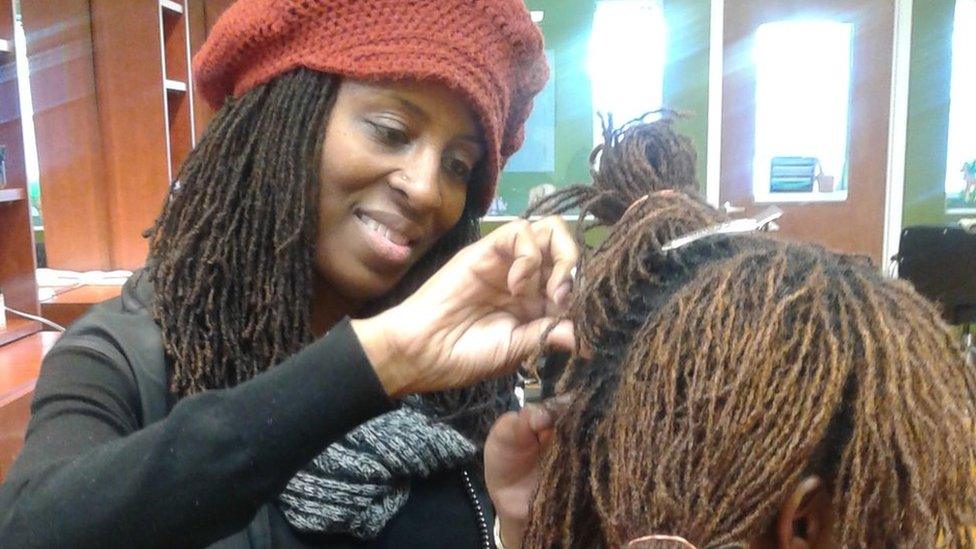US school faces backlash after black student's 'unnatural hair' criticised
- Published

Faith Fennidy, aged 11, sobs as she is told to leave class because of her braided hair style
A video of a schoolgirl leaving class because her braids violated school rules has generated a discussion on discrimination and the lack of understanding about black people's hair.
Eleven-year-old Faith Fennidy is shown in footage posted on Facebook, external wiping away tears as she packs up her belongings at the Christ the King Parish School in Terrytown, Louisiana.
Faith's mother Montrelle is heard asking a teacher to explain why her daughter's braids, that are tied in a ponytail, contravene school policy. "What's wrong with her hair? Her hair is fine," she says.
The private school says students cannot have extensions or hairpieces, that are often used to create long braided hairstyles.
In a statement to the BBC, the Archdiocese of New Orleans said the school's policy allowed only "natural hair".
"This policy was communicated to all parents during the summer and again before the first day of school, and was applied to all students.
"The school offered the student's family an opportunity to comply with the uniform and dress policy and the family chose to withdraw the student; the student was not suspended or expelled."
The Fennidy family say they have sought legal advice following what happened and are looking for another school for Faith to attend.
Allow Facebook content?
This article contains content provided by Facebook. We ask for your permission before anything is loaded, as they may be using cookies and other technologies. You may want to read Meta’s Facebook cookie policy, external and privacy policy, external before accepting. To view this content choose ‘accept and continue’.

Faith's brother Steven, who uploaded the footage on to social media, on Monday, expressed his disappointment at the lack of understanding about black people's hair and its manageability.
"Extensions make the hair easier to maintain. It allows my sister to have access to the swimming pool without having to get her hair redone every night," he said.
"How do you make a policy without even having a discussion? It's because you don't care and it's just one more barrier to entry for black people.
"This decision is going to affect black children more than white children," he stated in the Facebook post, which has been viewed more than two-and-a-half million times and shared more than 61,000 times.

Rapper T.I posted the footage to his Instagram page condemning the school's policy as "deplorable"
The footage has also gained traction on Instagram after rapper T.I posted his condemnation, external of the school, and offered his help to the family.
"This young lady is beautiful and her hair is perfectly fine. Unless of course you have an issue with black people's hair?"

You may also be interested in:

Many people responding to the posts were outraged by the school policy. Others were keen to point out the the advantages of braiding black hair.
"Braids is a protective style. I'm natural but always wear braids for convenience," posted one Facebook user., external
Allow X content?
This article contains content provided by X. We ask for your permission before anything is loaded, as they may be using cookies and other technologies. You may want to read X’s cookie policy, external and privacy policy, external before accepting. To view this content choose ‘accept and continue’.
While another commented: "It's sad that they are more worried about a hairstyle than a child getting educated."
A few of the comments defended the school's policy., external One post read: "To be honest wearing extensions while still in a uniform is way too grown-up. I wouldn't want my daughter looking no older than she is."
Last week a private Christian school in Florida faced similar criticism after it complained that a six-year-old boy's dreadlocks violated its rule on long hair.
Clinton Stanley posted to Facebook:, external "My son just got told he cannot attend school with his hair."
"Can I braid it up?" he is heard asking in the video.
"I don't think so, it's in our handbook - it has to be above the ears," is the reply.
Mr Stanley says: "This is very disrespectful and biased."
- Published6 May 2017

- Published20 March 2017

- Published15 May 2016

- Published31 May 2015
